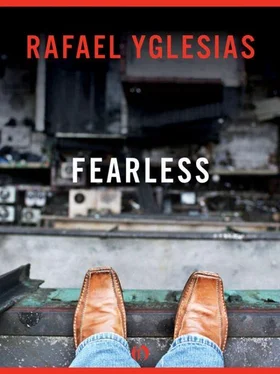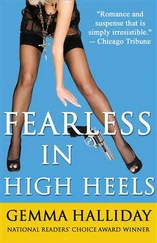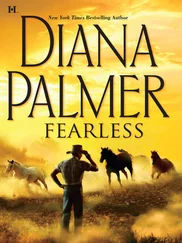He was trembling. He was frightened. But of what? “I’m forty-two years old, Mom!” He got himself turned and slung his legs out of the mechanical bed. It had been raised so high only his toes reached the floor. “Why don’t you tell me the truth! Are we strangers? Do I have to worm it out of you? Do I have to get you drunk?”
She took his arm and supported him as he slid down until both feet rested on the cold floor. “What do you want to know, Maxy?” she asked, startled into using her childhood name for him.
Standing beside her he looked down at her small skull, sparsely covered by dyed hair. He felt her feeble arm in his. He was astounded at how little and old she was. “You didn’t even try, Mom,” he said, despairing of the interrogation. He pressed on hopelessly. “Why didn’t you try to find another man? You lived without love—”
“I had love, Maxy, I had my children.”
“I mean sex! You lived without sex!” His head seemed to blow up. A bell of pain rang in his ears; a cloud of pain worsened the fog in his eyes. He slipped down into the chair she had moved next to his bed. The back of his dressing gown must have opened. His bare ass slid on the unnatural smoothness of the molded plastic seat. He had to grab hold of its sides with his hands to keep from falling out.
“You shouldn’t be up,” his mother said. She didn’t sound scandalized. With a child’s squeamishness he had expected her to react prudishly to any discussion of sex.
“Answer me,” Max said in a sigh of exhaustion.
“Sex,” she said wonderingly as if she had just discovered its existence. “It wasn’t that important. I didn’t miss it that much. I’ve read books that say I’m wrong. They say it was important to me,” she said without irony, still wondering. “I missed it sometimes and I—” she met his eyes and caught herself. She didn’t blush, but she smiled slyly and smirked with her curvy lip: “There are ways to have sex by yourself as I’m sure you know, Max.”
“Are you telling me the truth, Mom?” Max felt small and naive looking up at her. He was a middle-aged infant, unable to walk. “Didn’t you live without love for me?”
She considered his question thoughtfully. She frowned a bit, her eyebrows drawing together, but her puffy cheeks stayed smooth and untroubled. “It had nothing to do with you. Aunt Essie thought I should get married — to almost anybody, even a thief — just to get you a father. But you didn’t need a father, Max. ‘My little man,’ your father called you. And you were — long before he died — you were a man.”
“No, I wasn’t,” Max said. He wanted to weep. He couldn’t; his head was too smashed. “You made a mistake. I needed a man to help me carry my grief. And you’ve made a mistake with your daughter. She’s a widow who’s never been married.” There — he had spoken — the terrible secrets were out. He waited for the world to be destroyed.
“I don’t think I made a mistake,” she said easily, evidently unaware Max had dropped his nuclear bomb. She reached for his limp right arm. “Let’s get you back into bed.” She urged him up. “I didn’t want to marry the schnooks who were available. Until this thing happened, Max, until that plane tragedy, you were a fine man. Ask my friends, ask yours, and they’ll tell you — Max Klein is a mensch. So I don’t agree with your opinion of yourself.” She pushed him toward the high hospital bed. Max grabbed for it with the gratitude of a tired swimmer reaching for a life preserver. “As for your sister,” she said, nudging his legs up onto the noisy sheets, “she was damaged by what happened. No question. But she was much younger than you; she had less of your father; and she isn’t pretty and she doesn’t have a good sense of humor. I don’t care what anyone says — it’s a competition out there for men. You don’t have to be a great beauty; you don’t have to be a genius. But you have to have something — maybe even a bad quality, a vicious temper — for men to want to marry you. Maybe because there was no man in the house for her to learn how to entertain — maybe you’re right.” She rolled Max into the bed; he fell face-forward onto the stiff sheets. His sinuses were hot. He wanted to sleep. The planet was pulverized; listening to her rebuild it was exhausting. “I didn’t want to settle. Most marriages are unhappy, Max. Most women hate the lives they live with their men. I know. They call me with their complaints. Many of them bury their husbands and enjoy life for the first time. Your sister doesn’t miss a man. She misses children. I told her — she can have children without a man—”
“You’re wrong, Ma,” Max mumbled as his eyes shut. His brain wanted to visit a different part of the galaxy; a place with fewer bomb craters. “Women and children need a man—” he called back to earth.
“A good man, Max,” his mother said. “You rest. But if they don’t have a good man they’re better off alone.”
“No,” he told her as he launched into cool black space.
“We agree to disagree, Maxy,” she said. He fell toward the stars.
Max woke up with a clear head and a nosebleed. He phoned Brillstein, but the lawyer was out; Max left a message. He dozed lightly during the rest of the night replaying yesterday’s conversations; by dawn, he was convinced that Debby and Brillstein were up to something.
On his morning rounds the resident told Max he was better, ready to go home tomorrow, although he’d have to take it easy for a while. A psychiatric resident came by half an hour later and said he had to ask some routine questions because of the head trauma. It sounded like a lie. Max pretended his head was aching and asked him to come back later. The psychiatrist left.
Within five minutes Brillstein appeared in an excessively tight brown suit. The lawyer entered with his usual bustle. He scanned the room, obviously empty except for Max, and said, “You’re alone. Good.” Brillstein moved to the foot of the bed. He shifted his weight from one shoe to another restlessly. From his still position on the bed, Brillstein seemed to Max to be a skittish brown bird. “They want a meeting. About you, Mrs. Gordon and Mrs. Fransisca.” Brillstein’s head had been down while he searched for something in his breast pocket. The jacket was drawn so tight across the chest that his sleeve rode up nearly to the elbow and the right vent billowed like a skirt. “I just want to get a feel for what kind of numbers we might consider acceptable,” Brillstein said as he produced a small spiral notebook and a ballpoint pen. He looked at Max expectantly, a waiter ready to take his order.
“It’s what you’re going to get Nan and Carla that’s important,” Max said. “I’ve got plenty from the partnership insurance—”
“Shh! Shh! Shh!” Brillstein hissed with vehemence. He scolded Max with the ballpoint pen, shaking it at him. “Don’t talk like that. You’re not a well man. This whole experience has been horrific for you. We don’t know how long it will be before you’ll be able to earn a living again even leaving aside the loss of your firm’s key man.”
“Key man…?” Max pictured a fat man in medieval dress; and around his creased neck, he imagined a dazzling golden key dangling from a chain.
“Key man — Mr. Gordon. He brought in the clients and you did the designs. Maybe ‘key man’ is the wrong term from your point of view, but he did bring in the business. Obviously there would be no business to bring in if you weren’t doing the designing.”
Max remembered Jeff vividly: in his chair at his desk, swiveling at Max and then away, talking cheerfully to the phone, “We can do it — no problem. You’ll be as happy as Mr. Ben-David,” rolling his eyes at Max as he turned in his direction, then smiling at the ugly FIT buildings across the avenue as he swung away, always coaxing, always talking, keeping the clients busy with their greed for more space, more plumbing, more closets, more things…
Читать дальше












